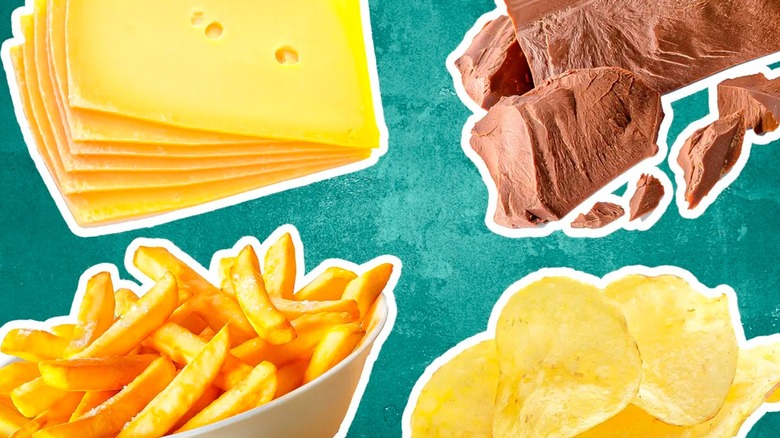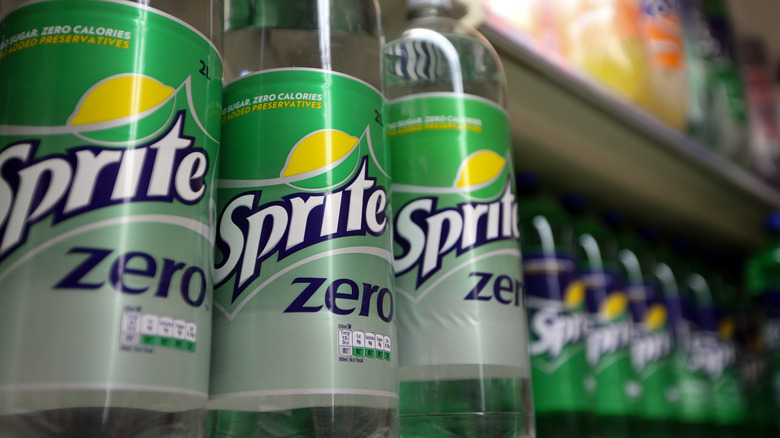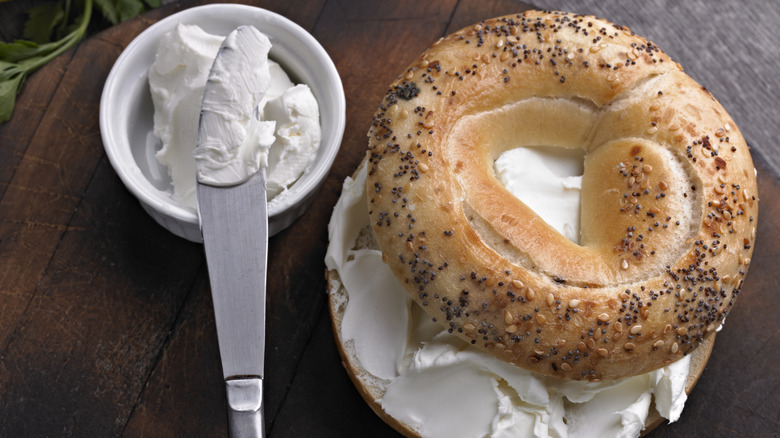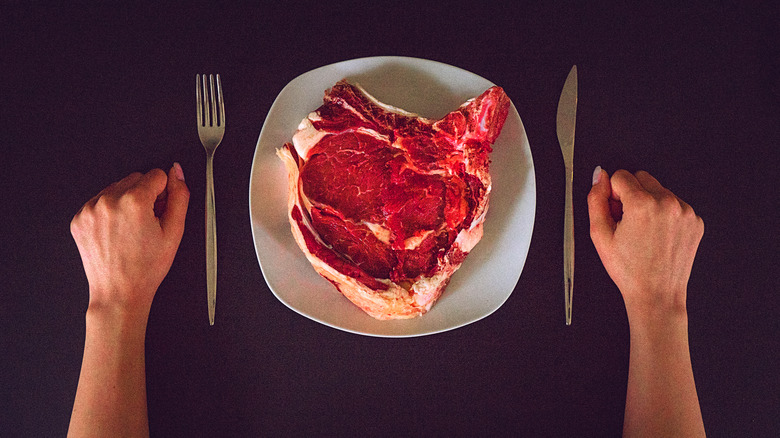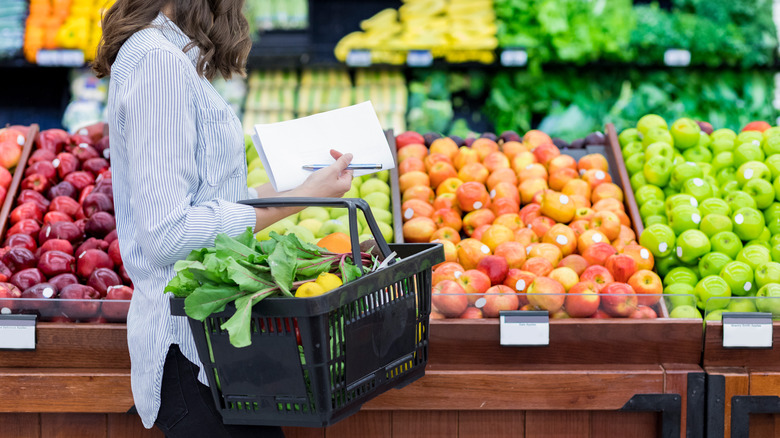The Most Addicting Foods And Why You Always Want More
Some foods taste so good, it's hard to stop eating them once you start. That doesn't mean they're necessarily addictive, but that's not to say some highly palatable foods aren't addictive either. When we talk about addictive foods, we mean those containing substances capable of affecting physical changes in us that can compel us to keep eating them even when we're not hungry anymore and despite the fact that past experience has shown us that negative consequences may result. Certain ingredients in foods are believed to drive compulsions to eat in the same way some substances may drive compulsions to use, according to a 2021 academic paper published in the Annual Review of Nutrition.
"Food addiction is a tricky topic, since we, of course, need food to survive," registered dietitian Elisa Bremner tells Mashed. "But certain foods seem to have a special power to drive us to eat more than is necessary." And, for the most part, those are foods containing added fat, added refined carbohydrates, sugar, caffeine, salt, thickeners, artificial flavors, dairy, and/or gluten. Those are among the ingredients that make ultra-processed foods hard to resist once you get started. On the other hand, food doesn't have to be processed to have that seemingly inexplicable hold on you once you get started. In fact, some of the most addictive foods come straight to us from nature. Let's take a look at the most addictive foods and what it is about them that has you always wanting more.
Sugar-sweetened beverages
Scientists are still debating whether sugar is "addictive" to humans, as opposed to merely being one among various ingredients that make foods "highly palatable," as the scientific community refers to foods that we always want more of due to external factors, including advertising and other forms of social conditioning. But scientific studies suggest that consuming sugar produces "neurochemical changes in the brain," similar to changes seen in drug and alcohol addiction, according to Icahn School of Medicine at Mount Sinai-affiliated registered dietitian Nicole Avena-Blanchard. This is certainly true when it comes to sugar-sweetened beverages (SSBs) which the CDC defines as any consumable liquid sweetened with any form of added sugar — including honey and raw sugar.
In 2018, a group of researchers from the University of California rounded up 25 adolescents who reported drinking at least three SSBs on a daily basis but who were willing to go without for three days. The resulting study published in the journal Appetite revealed that every single one of the teens reported withdrawal symptoms, including headaches and decreased motivation. As one of the researchers said to UC Davis, these findings suggest "these drinks may have addictive properties."
Nor does it help that when we drink SSBs, they don't do much in the way of satisfying us thanks to how quickly the sugar content is absorbed into the bloodstream, Bremner tells Mashed. Moreover, "consuming lots of sugary beverages ... has also been found to stimulate the desire for more sugary foods."
Caffeinated beverages
All SSBs are associated with limited feelings of satiety, subsequent and often rapid food cravings, as well as withdrawal symptoms when supply is cut off or delayed for whatever reason. But the additional presence of caffeine in some sodas, coffee drinks, and other SSBs tends to exacerbate these effects. Caffeine is regarded by scientists as a model addictive substance, according to a 2011 academic paper published in Current Drug Abuse Reviews. Indeed, the authors of that particular paper maintain that it's not just soda, but also, coffee drinks, which are responsible, at least to some extent, for helping to ratchet up demand for fast food in the last few decades.
Indeed, caffeine dependence is real, despite the fact that "caffeine addiction" is regarded as a clinical condition by only some health experts (e.g. World Health Organization) and not by others (e.g., the American Psychiatric Association). What is known is that caffeine is a central nervous system stimulant that "has the ability to enhance concentration, increase metabolism, and boost mood," according to Addiction Center, and some significant portion of the 90% of U.S. adults who consume the equivalent of two cups of coffee per day, could likely attest to that — as well as to how difficult it is to quit. Moreover, "if someone drinks caffeine on a daily basis, they will develop a tolerance just as they would to other drugs or alcohol," per the Addition Center.
Chocolate candy
All sugar-sweetened candy may be considered addictive. But chocolate candy, like those M&Ms you can't stop eating, are among the most addictive. In addition to sugar, chocolate candy contains caffeine. While the amount is significantly less than what's found in coffee, the presence of another stimulant in chocolate, theobromine, contributes to the addictive response for which chocolate is notorious. In fact, theobromine may be a more potent stimulant than caffeine, according to a 2013 academic paper published in the journal Psychopharmacology.
Likewise, the presence of fat in combination with sugar may exacerbate the triggering of what Harvard Health refers to as "reward pathways in the brain" that contribute to chocolate's addictive nature. In addition, studies suggest that the cacao in chocolate, specifically, may trigger the release of the feel-good hormone serotonin. Other substances found in chocolate (e.g., methylxanthines, biogenic amines, and cannabinoid-like fatty acids) may also combine with chocolate's inherent desirability in a way that engenders "abnormal behaviors and psychological sensations that parallel those of other addictive substances," according to a 1999 academic paper published in Journal of the American Dietetic Association.
Accordingly, despite the good feelings associated with chocolate consumption, "chocolate does not always make you happy," says Bremner, who notes that one study found that habitual eaters of chocolate demonstrate "anxiety and restlessness in the presence of chocolate cues — similar to symptoms seen in drug addiction." Further, this population was more prone to depression, although causation can't necessarily be attributed to chocolate.
Potato chips
"I bet you can't eat just one," teased the pro athlete Mark Messier in an ad for Lay's potato chips. And who would argue, especially now that science has demonstrated the various ways in which potato chips are one of the most addictive foods you can eat? According to Dr. Ray Schilling, a member of the American Academy of Anti-Aging Medicine, a 2018 clinical study published in the journal, CNS Spectrums, suggests that potato chips aren't just seductive because they taste good. Rather, consuming potato chips has been proven to stimulate a part of the brain called the nucleus accumbens, which is known by scientists as the brain's addiction center.
In that study, 17 healthy adults were fed either chips or zucchini (zoodles anyone?). In subsequent MRIs, it was observed that the nucleus accumbens lit up only in those who consumed chips. That's not surprising when you consider the brain releases dopamine and other feel-good substances in response to anything pleasurable, and these substances, in turn, stimulate the nucleus accumbens. But the researchers went further and found that the greatest stimulation, and therefore, the most addictive response, was in response to potato chips with a 35% fat to 45% carbohydrate macronutrient ratio.
And this response is apparently only exacerbated by the addition of salt and sugar, according to Bremner. "Pair that with supersized bags, a crunchy sound, salt, and fat to instantly stimulate the brain's reward pathways, and you've got a recipe for eating too much"
Chocolate chip cookies
"Human studies indicate that the combination of sweet and fat is more commonly associated with addictive symptoms than sugar alone," according to registered dietitian, Elisa Bremner. Accordingly, all cookies have the potential for driving compulsive eating, among other addictive responses, including withdrawal and compulsive seeking of supply notwithstanding known full awareness of the likely negative consequences, as Bremner told Mashed. "Taken from the usual fat-sugar-salt playbook, cookies seem uniquely designed to get us to eat just one more."
But there's one particular variety of cookie that Bremner and many other nutritional scientists note as being particularly addictive — and on a "neurobiological level" at that. We're talking about chocolate chip cookies. As much as we love them — especially fast food chocolate chip cookies, it would appear there is good reason to approach them with care. To wit, a 2013 study published in the journal, Current Opinion in Clinical Nutrition & Metabolic Care, found that "chocolate contains small amounts of a compound that triggers the same part of your brain as the addictive ingredient marijuana, THC," as Rare put it.
That, of course, dovetails with what others have said regarding substances in chocolate that make it hard to stop once we start eating it. Accordingly, eating chocolate chip cookies has been characterized as capable of inducing a response not unlike that which may be observed in users of cocaine and other addictive recreational drugs.
Sugar-free, artificially sweetened foods and beverages
Among other reasons you might want to think twice before eating foods containing artificial sweeteners is that scientists are in strong accordance that sweeteners of any kind have a way of inspiring us to overeat, as Ohio State University neuroscience expert and author, Dr. Gary Wenk, told CNN. The reasons are both physiologically- and psychologically-driven. To wit, fake sweeteners actually cause the pancreas to release insulin as if we've consumed sugar, itself, according to a 2020 study published in the Journal of Family Medicine and Primary Care. Nevertheless, the body has not actually gotten the reward it wants, which can lead to a strong physical drive to feed it more, Wenk explained.
By more, Wenk was referring specifically to more of the artificially sweetened food and/or beverage that we were already eating. That can lead to overeating, as functional medicine specialist Melissa Young, MD told Cleveland Clinic. "It can be easier to give in to that craving because you think you're making a healthier choice," when, in fact, artificial sweeteners are potentially more addictive than sugar. "If eating sugar sets off a firework in your brain, artificial sweeteners light up your system like closing time at Disney World."
And that, in turn, may lead to cravings for sugar itself. Indeed, Harvard Health points out that habitually consuming artificial sweeteners can desensitize us to the logical association between sweetness and calories, leading to our overconsumption of sweet foods in general.
Cheese and pizza
"As a plant-forward dietitian, I've heard ... 'I'd totally go vegan, but I could never give up cheese!'" Bremner tells Mashed. It's not solely because cheese tastes as good as it does. Rather it's about substances that cheese contains, including "salt, fat, and casomorphins that attach to the same brain receptors as heroin would." As Bremner explains, these are associated with the release of dopamine "that gives emotion priority over logic."
But cheese is just one of the factors that go into pizza being one of the most addictive foods you'll ever have trouble putting down. Bremner goes on to say that "a 2015 study from the University of Michigan found that the most reported 'problem food' [for people with food addiction issues] was pizza." And that's not just because pizza tastes so good that some have said "even when it's bad it's good."
Indeed, pizza is not just a highly palatable food, but it also tends to be highly processed so as to increase the concentrations of both carbohydrates and fat, according to Avena-Blanchard and the co-authors of the 2015 study, which was published in PLOS One. As noted above, together, these light up the brain's addiction center. At the same time, most commercially available pizzas will lack sufficient quantities of other constituent elements (such as fiber, protein, and water) that would otherwise help to slow nutrient absorption.
Bacon
The aforementioned 2015 study published in PLOS One also puts bacon in the food addiction hot seat. Unlike pizza and chips, bacon doesn't deliver a major carbohydrate punch (other than to whatever extent that sugar is used during the curing process). But bacon does deliver a highly addictive combination of fat and salt, not unlike what researchers have found to be compellingly addictive in potato chips. In that sense, bacon is not unlike cheese in its capacity to make it difficult, if not seemingly impossible, to stop eating it once we start. But bacon, which the study says contains 647 mg of sodium per serving, contains much more salt than cheese. Adding insult to injury, bacon may also feature sweet flavor notes, depending on the specifics of the curing process. And we've already discussed at length how that may factor into a food's addictiveness.
"Bacon is just that perfect combo of the sweet, the salty, the smoky, and the savory character." That's how it was put by consumer research expert and former manager of Oscar Mayer's "sensory evaluation group," Linda Papadopoulos, who CNN suggests, albeit jokingly, was there to help ensure that the bacon sold by Oscar Mayer was as hard-to-resist as it needed to be to make bank. "It's just this perfect combination of ingredients that goes right to the brain, which says, 'take another bite,'" Papadopoulos told CNN. Bacon may be even more addictive to those with an elevated BMI, according to the 2015 study's co-authors.
Bagel with a schmear
Compared with bacon, bagels and cream cheese may seem rather tame in terms of addictive potential. But there's nothing tame about this combo in that regard. As with the other foods we're discussing here, it's not just a question of being pleasurable to eat either. Rather, bagels and cream cheese check off some of the same addictive food boxes as pizza — and then some.
To wit, like pizza, bagels and cream cheese are dense with refined carbohydrates (in the bagels) and fat (in the cream cheese), and the combination of these two macronutrients is known to light up the brain's addiction center. Adding insult to injury, bagels are made with wheat. Moreover, cream cheese is dairy-based. "Both wheat and dairy are broken down into small protein fragments that have effects similar to opiate drugs such as morphine," according to Psychiatry Redefined.
With regard to wheat/gluten, the Gluten Free Society acknowledges that those who wean themselves may experience unpleasant withdrawal symptoms thanks, specifically, to gluteomorphins, which have been shown to be highly addictive. With regard to cream cheese and dairy, in general, casomorphins may play a role, as Bremner noted, but what will really get you is cream cheese's high-fat content, coupled with salt, not to mention the carbs in the bagel.
Red Meat
It would be easy to assume that all of the blame for food addiction would be on processed foods. But foods that aren't subjected to processing can be addictive too. And one of those foods is red meat, or steak, as the authors of the above-referenced 2015 study refer to it. It has been theorized this is due to the presence, in red meat and its juices, of naturally occurring substances that are known to stimulate the body's addiction center. These include albumin, hemoglobin and gamma globulin.
Plant-based physician Michael Klaper, MD, believes that animal flesh, in general (as opposed to red meat, alone) is addictive by virtue of both physiological and social conditioning that begins as early as infancy, as he explained to Plant Based News. American children are typically started on baby food chicken before they turn a year old, Klaper explains. So, from infancy, children are conditioned to both like and crave animal flesh.
As a result, the body becomes accustomed to an influx of the various substances found in meat, which Dr. Klaper says include carnitine and creatine. After a while, the body begins to make less of those substances, leading to deficiencies, which inspire cravings. And unless we satisfy our subsequent cravings, we experience withdrawal. "This is not normal human physiology," Dr. Klaper concludes. "It is an acquired dependency."
Your food choices in general could exacerbate your addictive response to specific foods
If some foods on our "most addictive" list surprised you because you can eat them and yet not feel compelled to keep eating until there's nothing left, there's a reason for that. According to Bremner, just because a food has the capacity to be addictive doesn't necessarily mean it will be equally addictive to all people. And some studies suggest that whether and to what extent an individual is prone to food addiction is related to what is and is not in that individual's overall diet.
For example, a 2022 study published in the International Journal of Environmental Research and Health found that among 515 female nursing students, those who self-reported consuming processed or red meats daily were more likely to score higher on the Yale Food Addiction Scale, which is the gold standard tool for measuring food addiction using self-reporting. The same was true for those who self-reported consuming pastries and soft drinks. Those who skipped breakfast also scored higher on the scale. Then there's the 2017 study published in Nutrients which correlated a higher consumption of vegetables with lower food addiction rates and severity. It further correlated a lower food addiction rate with higher consumption of sugary foods and beverages.
The relationship could be that there's something about fruits and/or vegetables that insulate us from the addictive effects of foods. If it is, score one for fruits and veggies.
